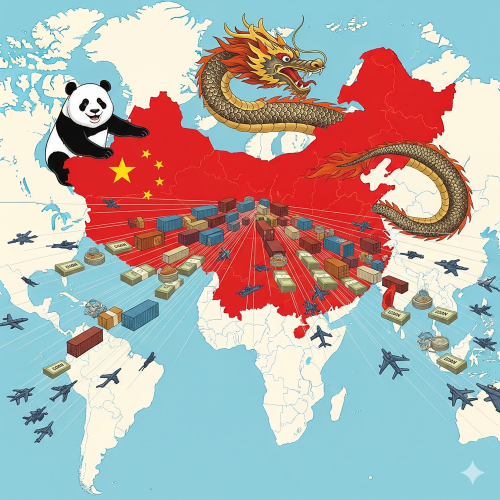Could China’s dominance in African digital infrastructure (Huawei, surveillance systems, 5G) affect sovereignty and privacy in African nations?

China’s dominance in African digital infrastructure can significantly affect sovereignty and privacy in African nations.
While Chinese technology provides a fast and affordable solution to Africa's digital divide, it comes with considerable risks, including the potential for foreign espionage, the spread of authoritarian surveillance models, and a loss of digital autonomy.
The Rise of China's Digital Silk Road in Africa
Chinese technology companies, most notably Huawei and ZTE, have become the primary builders of Africa's digital backbone. They have a near-monopolistic position, providing around 70% of the continent's 4G networks. This dominance is due to several key factors:
-
Affordability and Speed: Chinese firms offer "one-stop-shop" solutions that are significantly cheaper than Western alternatives. They provide comprehensive packages that include financing, network infrastructure, and maintenance, making them an attractive option for cash-strapped African governments and telecommunications companies.
-
Lack of Conditions: Unlike Western partners who often tie funding to governance reforms and human rights standards, China's model is based on non-interference. This is highly appealing to many African leaders who prefer to avoid external pressure on their domestic policies.
-
Meeting a Critical Need: Africa has a massive digital infrastructure deficit, and Chinese companies are rapidly filling that gap. They are building data centers, fiber-optic networks, and 5G infrastructure, accelerating digital connectivity and economic development across the continent. This has tangible benefits, such as reduced latency for online services and enhanced access to information.
Threats to Sovereignty and Privacy
Despite the clear benefits, China's digital dominance introduces profound risks to the sovereignty and privacy of African nations and their citizens.
Espionage and Data Exfiltration
The most significant threat is the potential for Chinese state-linked firms to conduct espionage. China's 2017 National Intelligence Law requires Chinese companies and citizens to support state intelligence gathering. This has raised serious concerns that data collected and stored on Chinese-built networks could be accessed by the Chinese government. A notorious example is the 2018 report of a data breach at the African Union headquarters in Addis Ababa, built and equipped by China. According to reports, data was being secretly transmitted to servers in Shanghai for five years. While China and Huawei deny any wrongdoing, the incident remains a potent symbol of the potential for espionage.
The Spread of Digital Authoritarianism
Chinese technology, particularly surveillance systems marketed as "Safe City" or "Smart City" projects, can be used to monitor and control populations. These systems integrate advanced technologies like facial recognition, mobile tracking, and data analytics. While promoted as a tool to fight crime, these systems are a key concern for human rights advocates who worry they could be used by African governments to suppress dissent, track political opponents, and monitor journalists. Reports have emerged of such technologies being used for political ends in countries like Uganda and Ethiopia.
Loss of Digital Autonomy
The widespread adoption of Chinese digital standards and technologies could lead to a loss of digital autonomy for African nations. Once a country's telecommunications backbone is built on Chinese technology, it becomes incredibly difficult and expensive to switch to another vendor. This "vendor lock-in" creates a long-term dependency on Chinese firms for maintenance, upgrades, and technical expertise. It also means that a country's digital infrastructure is shaped by Chinese-designed architectures and governance models, which may not align with its own national interests or democratic values.
The African Response and Future Outlook
African leaders and policymakers are not unaware of these risks. While they continue to partner with China, many are also attempting to navigate this new landscape with caution. Some are implementing national cybersecurity strategies and data protection laws, although many of these frameworks are still in their infancy.
The U.S. and its allies have recognized the strategic vulnerabilities created by China's digital dominance and have responded with their own initiatives, such as the Partnership for Global Infrastructure and Investment (PGII). However, these Western alternatives often lack the speed and financial scale of China's offerings.
Ultimately, whether China's digital presence enhances or undermines African sovereignty will depend on the ability of African governments to:
-
Negotiate transparent and equitable agreements with Chinese firms.
-
Develop and enforce robust regulatory frameworks for data privacy and cybersecurity.
-
Invest in local talent to reduce dependency on foreign expertise.
The rise of the "Digital Silk Road" in Africa presents both a tremendous opportunity and a significant challenge. It promises to connect the continent and drive economic growth, but it also forces a critical conversation about the trade-offs between connectivity, sovereignty, and individual privacy in an increasingly interconnected and technologically-driven world.
- Questions and Answers
- Opinion
- Motivational and Inspiring Story
- Technology
- Live and Let live
- Focus
- Geopolitics
- Military-Arms/Equipment
- Segurança
- Economy
- Beasts of Nations
- Machine Tools-The “Mother Industry”
- Art
- Causes
- Crafts
- Dance
- Drinks
- Film/Movie
- Fitness
- Food
- Jogos
- Gardening
- Health
- Início
- Literature
- Music
- Networking
- Outro
- Party
- Religion
- Shopping
- Sports
- Theater
- Health and Wellness
- News
- Culture

